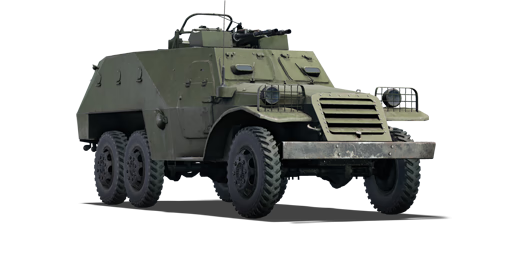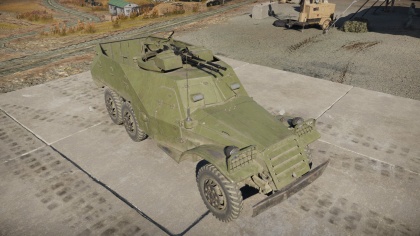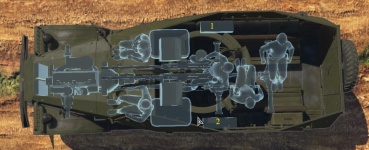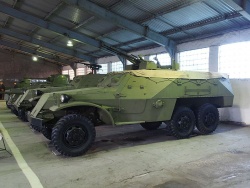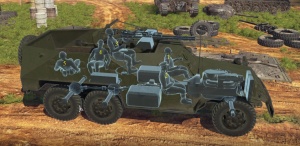BTR-152A
Contents
Description
The KB ZIS BTR-152A is a rank II Soviet Self-Propelled Anti-Aircraft gun
with a battle rating of 3.0 (AB) and 2.7 (RB/SB). It was introduced in Update 1.71 "New E.R.A". As with any APC, it features light armour on a spacey vehicle, a good crew count, a decent gun and good mobility. Since there is no infantry to fight, the BTR is used as an AA in-game.
The BTR-152 is an Armored Personnel Carrier (APC) on a six-wheeled, open-topped truck chassis, meaning unlike the Soviet truck-mounted anti-aircraft vehicles, it can survive low-calibre MG fire from ground vehicles. However, anything above 30 calibre doesn't have much trouble taking this vehicle down. It features a top-mounted twin KPVT gun mount with good traverse and elevation rate. Something to note is the presence of the two spare loaders in the back. Inexperienced players, or those who don't know the structure of the BTR-152A, tend to repeatedly shoot the cab of the truck, leaving these two crew members relatively unharmed.
General info
Survivability and armour
While armour is nothing impressive for any BR, it is in no way rubbish or useless since it protects the crew from most light ground menaces such as machine-gun fire, most indirect artillery shrapnel, low-caliber HE shells and even some medium-range heavy machine gunfire. These light plates have some chances not detonating incoming APHE rounds, virtually turning them into pure AP shells. To maximize this effect, one should never face tanks upfront. It is recommended to always show side armour if fired at, as from the side, modules are quite spaced out. Avoid autocannons at all costs since any of them can shred this APC in no time from almost any angle. Anyways, in most scenarios, it is better recommended to just hit the gas and avoid any incoming shots/artillery fire.
Armour type:
- Rolled homogeneous armour
| Armour | Front (Slope angle) | Sides | Rear | Roof |
|---|---|---|---|---|
| Hull | 13 mm (34-64°) Grille 13 mm (41°) Windshield 6 mm (84°) Hood |
10 mm (0-22°) Main hull 6 mm (0-38°) Above wheels |
8 mm (0°) | N/A |
| Turret | 6 mm (15°) Magazine 10 mm (0°) Gun rack |
N/A | 6 mm (0°) | N/A |
Notes:
- Wheels are 2 mm thick.
Mobility
| Game Mode | Max Speed (km/h) | Weight (tons) | Engine power (horsepower) | Power-to-weight ratio (hp/ton) | |||
|---|---|---|---|---|---|---|---|
| Forward | Reverse | Stock | Upgraded | Stock | Upgraded | ||
| Arcade | 91 | 12 | 8.6 | 156 | 210 | 18.14 | 24.42 |
| Realistic | 83 | 11 | 97 | 110 | 11.28 | 12.79 | |
Here is an interesting feature that can provide any wise commander with a few hits: BTR-152A's speed. This light APC can carry itself over the road at breakneck speeds, provided it can ride a paved road. In good circumstances, it can reach over 80 km/h and keep its good speed even while turning, due to its wheeled chassis. Offroad mobility is not bad, meaning it can easily follow medium and light tanks on any terrain, making for an effective flanker. Backwards, speed tops at -20 km/h, which is enough to get out of an ugly situation if needed. With its large wheels, this truck can cross some small trenches and rivers, where its GAZ and ZiS truck counterparts would ditch. This truck's centre of mass is quite low, allowing it to turn at high speeds without rolling.
Armaments
Main armament
This is where this truck shines over its predecessor and followers: it has a higher rate of fire and more ammunition while retaining a good armour penetration and having a fully rotating turret (where the 72-K trucks are unable fire directly in front). Each ammo loadout can effectively engage tanks' sides with relative ease (at close range) and easily shred even heavy planes. The guns can fire for 10 seconds before overheating, or ~150 bullets, half of their magazine.
| 14.5 mm KPVT | |||||
|---|---|---|---|---|---|
| Capacity (Belt capacity each) | Fire rate (shots/minute) |
Vertical guidance |
Horizontal guidance |
Stabilizer | |
| 1,200 (150) | 600 | -5°/+89° | ±180° | N/A | |
| Turret rotation speed (°/s) | |||||
| Mode | Stock | Upgraded | Prior + Full crew | Prior + Expert qualif. | Prior + Ace qualif. |
| Arcade | 40.51 | 56.07 | 68.08 | 75.29 | 80.09 |
| Realistic | 27.37 | 32.2 | 39.1 | 43.24 | 46 |
| Reloading rate (seconds) | |||||
| Stock | Prior + Full crew | Prior + Expert qualif. | Prior + Ace qualif. | ||
| 10.4 | 9.2 | 8.48 | 8 | ||
Belt statistics
| Ammunition | Penetration in mm @ 0° Angle of Attack | |||||
|---|---|---|---|---|---|---|
| 10m | 100m | 500m | 1000m | 1500m | 2000m | |
| Universal | 31 | 27 | 22 | 17 | 15 | 13 |
| API-T | 45 | 42 | 29 | 21 | 19 | 17 |
| IAI | 27 | 26 | 19 | 16 | 14 | 12 |
Belt types
| Belts | Shell composition | Combat usage |
| Universal | AP-I, API-T, IAI | This is the default belt in usage up until unlocking the API-T belt. It can effectively engage both tanks and planes but is not as good against tanks as the API-T belt. |
| API-T | API-T, AP-I(c), API-T, IAI | Once unlocked, this is the best belt for dealing with both ground and air target. 1/4 of its bullets can rip through some side armour (close range) at this BR. Another 1/4 of this belt is specifically purposed against planes. The last 1/2 is general-purpose API-T, okay but not good against both tanks and planes |
| IAI | IAI, API-T | Specific belt for hunting planes 1/2 of this belt is IAI ammo, which has no penetration but sets fires to planes quite easily. In emergency situations, can be used against tanks. |
Ammo racks
| Full ammo |
1st rack empty |
2nd rack empty |
Visual discrepancy |
|---|---|---|---|
| 1,200 | 600 (+600) | 0 (+1,200) | no |
Usage in battles
As an AA vehicle, this thing is deadly to CAS that gets close. The MGs have good RPM and a good spread which is important in AA. As long as you lead correctly this vehicle can be used to shield you from 250 lbs - 1,000 lbs from the Allied aircraft or the 500 kgs from the Germans. If down-tiered, it should do alright against most tanks as it has quite good penetration, but if up-tiered, you need to get on the sides or rear of most tanks.
Stick close to the middle of the pack, but not too close to anyone to avoid becoming too obvious a target for tanks or aircraft. It is a good idea to stay close to the front lines, to help protect against aircraft and spot enemy tanks. It does have somewhat poor ammo capacity, so one might benefit from staying on a point to reload while swatting planes out of the sky.
This vehicle can easily be used as a frontline AA and skilled players can even flank with such a truck.
Frontline AA
Stick to allies and watch the skies. Team play is key with this SPAA since it cannot effectively destroy most ground targets from the front; it will often have to rely on ally firepower. When the battle gets hot, do not hesitate to hit the gas and reach cover while keeping an eye on the sky. Watch out for fighters since they will try to strafe this juicy open-topped target. Loading the API-T belt is recommended, as it can engage both tanks and planes (both of them can appear in sight at any moment).
Flanker
Be sneaky. Any tank can end this truck (or at least critically damage it) at any range. Use the road to maximize mobility and strike quickly. Take out tanks by their sides, empty your magazines and retreat to cover, and make sure to not stay in the same spot for too long. If the enemy knows your presence (turret turned towards you), abort flanking manoeuvres and return to the safety of the team.
Modules
| Tier | Mobility | Protection | Firepower | ||
|---|---|---|---|---|---|
| I | Tires | Parts | Horizontal Drive | IAI | |
| II | Suspension | Brake System | FPE | Adjustment of Fire | API-T |
| III | Filters | Crew Replenishment | Elevation Mechanism | ||
| IV | Transmission | Engine | Artillery Support | ||
Pros and cons
Pros:
- Good rate of fire (effective anti-aircraft)
- All ammo loads contains AP shells with at least 25 mm of penetration
- Elevation of 89° and 360° rotating turret means very little to none anti-aircraft blind spot
- Small turret and high mounted guns make hull-down position extremely effective
- Can fire a whole 10 seconds before weapons jams due to heat
- Huge magazines, reloading is rare
- Huge ammo load means it is unlikely to go dry
- Decent damage
- Can cross small trenches
- Fast turret traverse and elevation
- Small ammo racks
- Less likely to be destroyed by ramming compared to the GAZ trucks
Cons:
- Armour piercing rounds lose a lot of penetration power between 100 and 500 m
- Very high vehicle and large target
- Long reload time
- If firing continuously can only fire half of its mag before having to unjam weapons
- Atrocious performance in deep snow and sand
- API-T belt only consists of 1/4 cermet round, which is the highest penetration round
- Open-topped, vulnerable to strafing planes and artillery
- Vulnerable to HMG and autocannons
- Only -5 degrees of gun depression coupled with the high turret placement can make aiming at close targets difficult
History
The BTR (Russian: Бронетранспортер/Bronetransporter- or “armoured transport”) was a modified design according to the Zwas-151 truck. It features a 6x6 chassis with an additional 5 tons of sloped armour. The mobility and speed were inferior to the original Zwas-151 truck, but it relied on more protection, which was vital than speed. By 1960 the model had been significantly improved in terms of its main characteristics.
The BRT-152 became the main Soviet armoured personnel carrier (APC) which was then replaced by the 8x8 model BTR-40 later on. The BTR-152A was the SPAAG variant with a double ZPTU-2 or quadruple ZPTU-4 KPVT 14.5 mm heavy machine guns set up.
In terms of aesthetics, the vehicle was influenced by US and German half-tracks, while utilising regular tires instead of tracks. The engine was at the front and the radiator was protected with armoured shutters. There were 10 fire points with pistol ports allowing protection for the crew.
Despite being 70 years old as of March 2020, BTR-152s still see service worldwide. Most are in use by Syria at around 600 in service, followed by North Korea with 300. War Thunder's BTR (the BTR-152A) is likely also still in service as well. One of its most notable uses was by the Ethiopian Army during the Ogaden War(1977-1978).
Media
- Images
See also
Links to the articles on the War Thunder Wiki that you think will be useful for the reader, for example:
- reference to the series of the vehicles;
- links to approximate analogues of other nations and research trees.
External links
| USSR anti-aircraft vehicles | |
|---|---|
| GAZ-AAA | GAZ-AAA (4M) · GAZ-AAA (DShK) |
| BTR-152 | BTR-152A · BTR-152D |
| Wheeled/Half-tracked | GAZ-MM (72-K) · ZiS-12 (94-KM) · ZiS-43 |
| Radar SPAAG | ZSU-23-4 · ZSU-23-4M4 · ZSU-37-2 |
| SAM | Strela-10M2 · 2S6 · Pantsir-S1 |
| Other | ZUT-37 · ZSU-37 · BTR-ZD · ZSU-57-2 |
| Czechoslovakia | M53/59 |
| North Vietnam | ▂Phòng không T-34 |


